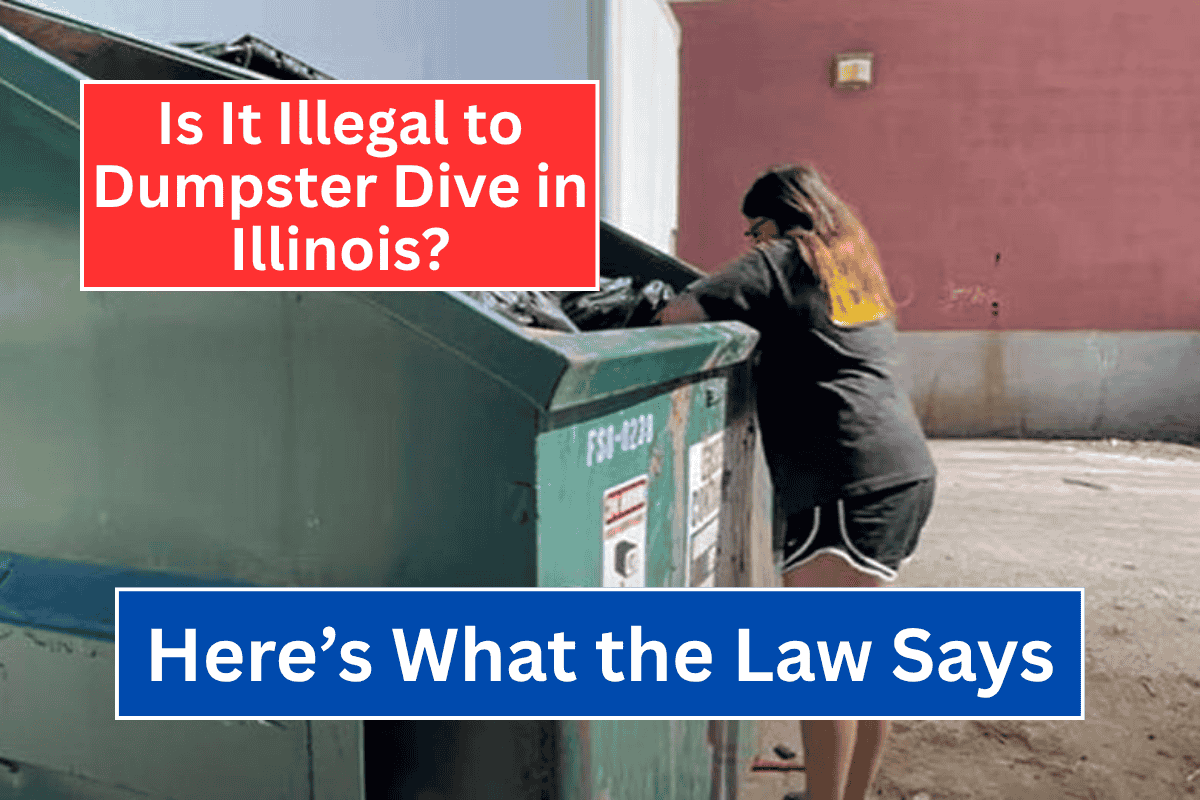Dumpster diving, the act of searching through discarded items in trash bins or containers, can be a way to find useful items like food, furniture, or electronics. However, in Illinois, this practice exists in a complex legal landscape that varies by location.
While there’s no statewide law explicitly banning dumpster diving, individuals need to navigate a mix of local ordinances, property rights, and public safety concerns that can make it illegal or unsafe in certain situations. Here’s a breakdown of the key factors you should consider before diving into a dumpster in Illinois.
Is Dumpster Diving Legal in Illinois?
At the state level, Illinois does not have any laws that explicitly ban dumpster diving. This is in line with the 1988 U.S. Supreme Court decision in California v. Greenwood, which ruled that discarded trash in public spaces is not protected by privacy rights. This means, according to federal law, searching through trash in public places is legal.
However, the Supreme Court decision only applies to public spaces. Local laws can still impose restrictions, and these can vary significantly from one city or town to another.
Local Regulations and Ordinances
While dumpster diving may be allowed in public areas, local ordinances can add complexity. In places like Chicago, for example, you need a private scavenger license to sift through trash. This license costs about $250, and diving without it can result in fines ranging from $250 to $500.
Other towns in Illinois may have similar rules, requiring a permit or imposing fees for dumpster diving. Therefore, it’s important to check with local authorities before diving into any dumpster to avoid potential fines or penalties.
Trespassing and Private Property Concerns
Even in towns where dumpster diving is not explicitly banned, you may still face legal issues related to trespassing. If you enter private property without permission to access a dumpster, you could face serious consequences, including fines or arrest.
Common signs indicating private property include:
“No Trespassing” signs
Locked gates or fenced enclosures
Private property warnings on dumpsters
If you ignore these warnings and access the dumpster anyway, you could be charged with trespassing, which can lead to legal trouble.
Disorderly Conduct and Public Safety Risks
In addition to trespassing, disorderly conduct charges can arise from dumpster diving if:
The activity disturbs the peace
It creates a public nuisance
Other people file complaints
For example, if a dumpster diver causes a mess or is disruptive, law enforcement might issue a citation or even make an arrest. If the activity involves illegal dumping (such as leaving behind trash or litter), you may also face fines for breaking local waste management laws.
Health and Safety Risks
While not a legal concern directly, health and safety risks are an important consideration for dumpster divers. The risks of exposure to harmful bacteria, sharp objects, and toxic materials are significant. Proper handling of waste is critical to avoid injury or illness.
Here are some best practices to follow to ensure your safety and legal protection:
Best Practices for Dumpster Diving in Illinois
1. Research Local Laws
Before dumpster diving, check your city or county regulations. Some places require special permits, licenses, or have restrictions on when and where you can dive.
2. Seek Permission
Always ask for permission from property owners or businesses before accessing a dumpster. This helps you avoid trespassing and shows respect for property rights.
3. Respect Property Boundaries
Avoid locked dumpsters, fenced areas, and places with “No Trespassing” signs. Entering these areas is not only illegal but can lead to higher fines or arrest.
4. Leave No Trace
After you’ve taken what you need, clean up the area. Leaving trash behind could lead to accusations of illegal dumping or littering.
5. Prioritize Safety
Wear gloves, protective clothing, and be cautious of sharp objects or hazardous materials. This will help protect you from injury and health risks.
In Illinois, dumpster diving isn’t outright illegal, but it’s subject to local ordinances, property laws, and public safety regulations. To avoid trouble, know your local laws, get permission, and always respect property boundaries.
By following the law and being mindful of safety, you can enjoy the benefits of dumpster diving without the risks of legal or health issues.












